 Image: Pexels Who should receive an old-age pension? Old-age retirement is a right for all INSS policyholders who meet the minimum requirements to retire. Whether they are municipal police officers, or special police officers, such as rural employees.
Image: Pexels Who should receive an old-age pension? Old-age retirement is a right for all INSS policyholders who meet the minimum requirements to retire. Whether they are municipal police officers, or special police officers, such as rural employees.Among all INSS benefits, retirement due to age is one of the most relevant. After all, it guarantees the right to a dignified life for citizens who have spent their lives working and contributing.
Follow along to find out who is entitled to an old-age pension.
Understand who is entitled to old-age retirement Any INSS insured person who meets the age, waiting period and payment requirements will be able to receive old-age retirement. That's why:
Grace period: is the minimum amount of monthly payments that a taxpayer needs to receive the INSS benefit; Contribution: period during which the insured person successfully contributed to Social Security, voluntarily or even obligatory. Whereas the required age is the minimum number of years a person must be. This need differs for men and women. Furthermore, it is also different for urban workers and people with special insurance.
Who is entitled to retirement based on age and what are the eligibility requirements? The retirement age requirements for a worker in urban areas are as follows:
65 years for men and 62 years for women (according to the new Social Security law); 180 months free; 15 years of contribution for women and 20 years for men. These requirements apply to those who started contributing to the INSS from November 13, 2019. However, if this is not your case, you may fall under the old law or the transition law.
The transition law applies to those who did not meet all the requirements on November 12, 2019. However, they started contributing to the INSS before that date.
The old rule applies to all taxpayers who started contributing to the INSS before November 12th.
Understanding the Transition Law and the Old-Age Pension Law Who is entitled to an old-age pension under the Old-Age Law and the Transition Law? Check it out:
Retirement under the old law: men aged 65 and women aged 60, both with 180 months of INSS exemption; Transition rule: men must be 65 years old, women must be 61 and a half and they offer 15 years + 180 months of waiting period for both. Therefore, the employee needs to be aware of which law is primarily relevant to claiming their benefit. After all, if there is any irregularity, the INSS may reject your request.
Final Advice It should be noted that rural workers and other special insureds are not covered by the new Social Security law. Why haven't retirement age requirements changed?
This means that the insured can retire five years earlier. That is, 60 years for men and 55 years for women. The required waiting period is also 180 months.
Now you know who is entitled to an old-age pension. Leave your comment!
